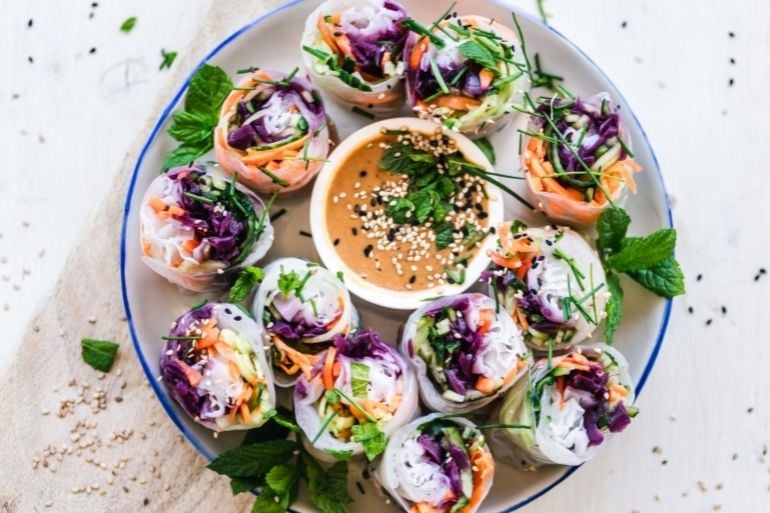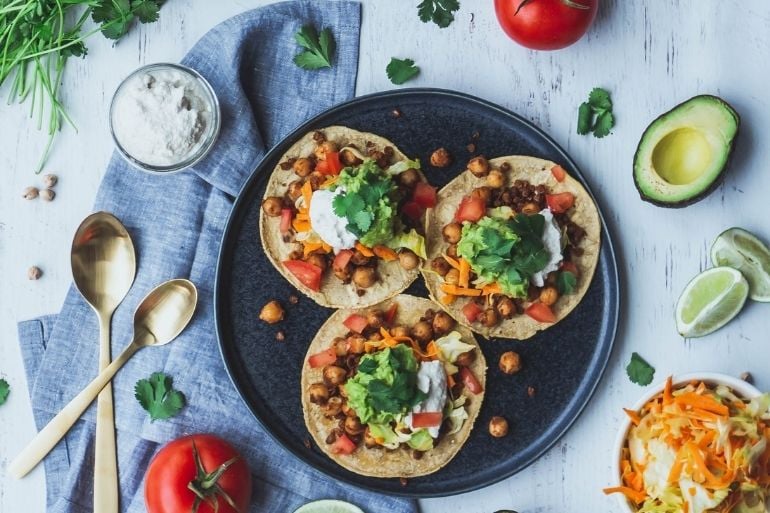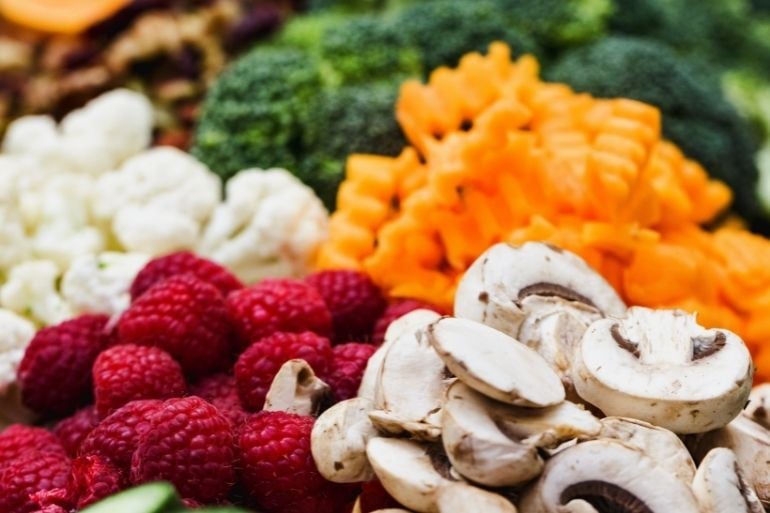May 28, 2020
June 10, 2021
Are you considering trying a vegetarian or vegan diet in Spain? There are a lot of reasons to eliminate meat and animal products from your diet. First of all, reducing meat or dairy intake can help us eliminate harmful greenhouse gases. Secondly, the industrialization of the industry has led to animal cruelty in some instances. Maybe you just don’t like the taste of meat or want to eat more fruits and vegetables.
Unfortunately, there are a lot of vegetarian and vegan diet myths circulating out there. Before you make the jump into your new diet and lifestyle, find out the truth about going full-veggie!
What’s a vegetarian vs. a vegan?
Before we start, let’s understand the difference between a vegetarian and a vegan. Being a vegetarian means you do not eat any meat, fish, shellfish or by-products of animal slaughter (such as gelatin or chicken stock). While being a vegan means avoiding all the above animal foods plus by-products including dairy, eggs, honey, as well as materials such as leather, products tested on animals, etc. In addition, many vegans are against the practice of keeping animals as pets and oppose places like zoos and circuses that use animals for “entertainment”.
Each and every vegetarian and vegan is different, so grouping them into such limited definitions is restricting. Talk to your veggie-based friends and ask them about their experience or join a community to get an inside perspective. Now that that’s sorted, let’s dive into the top 5 myths below:
Myth 1: A vegetarian or vegan diet is expensive
While many people believe that going vegetarian or vegan will leave a substantial dent in their wallet, most vegetable-based meals are the same price or cheaper than a diet that includes meat and fish. For example, meal staples like lentils, rice, and beans often come in large, budget-friendly quantities that can be used to create any meal.
That being said, it is true that “fake” meats can be expensive. However, this isn’t the only way to substitute meat. For example, at a barbecue, you can grill corn, tofu, eggplant, or jackfruit instead of buying expensive fake sausages. While there are currently a limited set of choices for meat alternatives, the global meat substitute market is expected to reach $8.1 billion by 2026, so you can bet that this growing market will innovate in terms of choice and price. Check out these 13 industry predictions.
Furthermore, you might have heard that you can only shop at specialty stores that provide alternatives to animal products. While they tend to be the most reliable and will certainly provide you with more information behind the food you’re buying, these stores aren’t the only ones offering vegetarian and vegan choices nowadays. Big-chain supermarkets are realizing that more and more people want to try to go animal-free and are incorporating these types of options into their stores.
Myth 2: A vegetarian or vegan diet is unhealthy
As you know from the trusty food pyramid, fruits and vegetables are the basis of a healthy diet. It is recommended that you eat 2-3 servings of fruit and 3-4 servings of vegetables per day. While in the past, the food pyramid emphasized eating meat and dairy, nutritionists now understand that limiting our meat intake, eating alternatives, and taking supplements can be just as healthy.
It must be noted that this point highly depends on the person. A person who follows a diet that includes meat that is constantly eating fast food, fatty foods and sweets, unhealthy carbs, and excessive quantities, will be much less healthy than a person who follows a well-rounded vegetarian or vegan regimen. However, a vegetarian or vegan who relies on fake meats made of artificial ingredients or sugary milk substitutes, could be unknowingly following an unhealthy diet. Check out the NHS's recommendations for a well-rounded vegan diet.
No matter what type of diet you choose, if you start to feel bad or weak, or experience stomach issues, talk to your doctor about what might be causing these symptoms.

Myth 3: A vegetarian or vegan diet lacks protein
This is one of the most prevalent vegetarian and vegan diet myths. Many people believe that only meats and fish provide us with an essential source of protein, but that’s not true. There are a lot of non-meat options that can provide nearly complete proteins. Complete proteins are protein sources that contain adequate amounts of all nine essential amino acids.
Common protein sources for vegetarians and vegans include:
- Rice, beans, chickpeas, lentils, and quinoa
- Soybean-based foods like tofu, tempeh, and edamame
- Buckwheat and nutritional yeast
- Spirulina algae
- Hemp and chia seeds
- Peanut butter
- Supplements and protein shakes
Consult your doctor before beginning on your new vegetarian journey to know how to achieve a well-rounded diet.
Myth 4: A vegetarian or vegan diet is boring and has limited options
Looking into the world of vegetable-based recipes will open your eyes! Many cuisines like Ethiopian and Indian food are naturally plant-based. Check out these 8 global vegan-friendly cuisines. I have found that some of my favorite dishes can be easily taken meatless. For example, for chili, instead of using ground beef, I chop up mushrooms for a similar feel, throw in all the spices and veggies that I normally use, and enjoy the same delicious meal. I’ve also substituted burgers for homemade corn or chickpea burgers, and meatballs for ground-lentil “meat” balls. It’s all about being creative and re-learning how to cook!
Additionally, since we lived in the golden age of online resources, there are endless vegan and vegetarian websites, bloggers, recipe books, and communities you can consult. Check out this comprehensive list of the top veg websites. The Vegan Society is useful for all information on the vegan lifestyle. Tasty makes vegan and vegetarian Facebook videos. Deliciously Ella recipe books share delicious recipes and ways to feel better through a plant-based lifestyle.

Myth 5: It’s hard to eat out as a vegetarian or vegan
This depends on where you live. While in small towns and rural areas there may be limited choices, in larger cities, vegetarian, vegan, and gluten-free options are on the rise. They are available in many restaurants and most supermarkets. Moreover, as mentioned above, many countries in Asia and Africa have naturally plant-based or meat-free diets, so if you live or visit there, you’ll find that it’s easy to go full-veggie!
That being said, in Western countries, and particularly in Spain, it can be somewhat difficult to eat out at restaurants due to the traditional cuisine being based in meats and cheeses. Madrid and Barcelona have the most offerings, and it’s much better now than in the past, but there is not much regulation and there is a lot of misinformation on menus.
In Spain, there are a growing number of restaurants catering to the vegetarian and vegan crowd. For those living in Madrid, discover this list of the top vegetarian and vegan spots. In my personal circle of friends, they follow La Colectiva Café on Instagram for inspiration on how vegan cooking can be varied, delicious, and exciting. Or go to their store in Madrid! For those living in Barcelona, discover this list.
If you’re looking for more information on food, health, and wellness in Spain, check out the Typical Non Spanish blog. If you’d like to explore your healthcare options in Spain, discover Caser Expat Insurance.
|
If you are searching for health insurance in Spain, Caser Expat Insurance has the right policy for you! |
.png?width=344&height=67&name=logo_caser%20(2).png)









Let Us Know What You Thought about this Post.
Put your Comment Below.